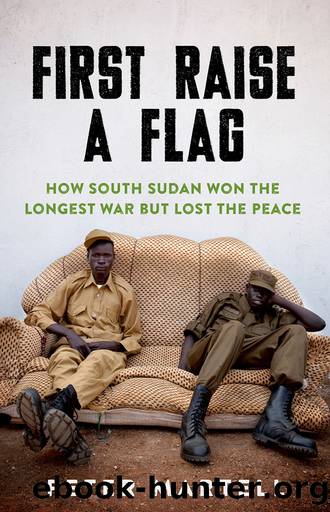First Raise a Flag: How South Sudan Won the Longest War but Lost the Peace by Peter Martell

Author:Peter Martell [Martell, Peter]
Language: eng
Format: epub
Tags: political science, World, African, history, Africa, East
ISBN: 9780190083380
Google: xrSXDwAAQBAJ
Publisher: Oxford University Press
Published: 2019-04-15T00:31:16.794551+00:00
10
THE LAND OF KUSH
âViolence can destroy power; it is utterly incapable of creating it.â
Hannah Arendt. 1
Twisting my head to stare out of the grubby airplane porthole, I looked onto a different world of green hills covered with wisps of cloud. Tiny villages appeared in small clearings of forest. Thin, red and twisting pathways connected each to each like capillaries on a breathing body. Then the land grew drier, the villages fewer, and the plains became yellow, dry savannah. It was 2006, and I was flying to Juba. Since conversation wasnât possible, I had time to think, or at least try to, as the thudding judder of the propellers vibrated the metal panels beneath our feet. As the plane tilted, we slid forward towards the jumbled bags and boxes stashed at the front. Two crates of Nile Special beer took pride of place.
Seen from up high, the land seemed endless. I stared at the sweeping, meandering waters below, where wisps of smoke rose from a fishing camp on an island in the swamp. Terrible things had been done here, and there would be no quick fix. So long at war had divided people, so the need for reconciliation was acute. I opened my notebook, and asked myself a question. If nationalism is such a powerful force that people will die for their country, what makes a state?
Nations are human creations. First, I wrote, there were the borders, the frontiers that made it a separate land. Then, there were the obvious emblems: a flag, national anthem, football teams, a coat of arms, currency and passports too. Yet they were the trappings of state, for symbols do not make a country alone. There were the institutions: a government, judiciary, police and an army, the laws and taxes they impose, and the services they should provide. Then there were more intangible elements: culture and common identity, a shared history. But what about language? How did ethnicity fit in? I added question marks after those. Then I scribbled it all out.
For almost every attribute, I could think of an exception. âWar made the state, and the state makes war,â I remembered from a lecture long ago.2 Yet saying what a nation does is not the same as defining what it is. Nations can feel ancient and eternal, but, beneath the foundation myths, most are very modern constructs. Academics call them imagined communitiesâsocial creations that conjure up a collective sense of comradeship. Yet they are dreams so potent that people will sacrifice everything for them.3
What made the distinction between âusâ and âthemâ? I thought of Britain, where I was from. Weâd been state-building since the Romans left, but I still couldnât explain what made our many countries one nation.
What South Sudan faced was very different: to not only define their nation, but then construct it too. Amid their many identities and languages, they were proud to share that of Junubin, âSouthernersâ in Arabic. The problem was, what did that mean? It was an identity fed by centuries of pain and shared suffering.
Download
This site does not store any files on its server. We only index and link to content provided by other sites. Please contact the content providers to delete copyright contents if any and email us, we'll remove relevant links or contents immediately.
| Africa | Americas |
| Arctic & Antarctica | Asia |
| Australia & Oceania | Europe |
| Middle East | Russia |
| United States | World |
| Ancient Civilizations | Military |
| Historical Study & Educational Resources |
Machine Learning at Scale with H2O by Gregory Keys | David Whiting(4289)
Never by Ken Follett(3930)
Fairy Tale by Stephen King(3366)
Oathbringer (The Stormlight Archive, Book 3) by Brandon Sanderson(3129)
The Man Who Died Twice by Richard Osman(3065)
Will by Will Smith(2904)
Rationality by Steven Pinker(2348)
Can't Hurt Me: Master Your Mind and Defy the Odds - Clean Edition by David Goggins(2319)
The Dark Hours by Michael Connelly(2299)
Friends, Lovers, and the Big Terrible Thing by Matthew Perry(2211)
The Dawn of Everything: A New History of Humanity by David Graeber & David Wengrow(2186)
Principles for Dealing With the Changing World Order: Why Nations Succeed and Fail by Ray Dalio(2033)
A Short History of War by Jeremy Black(1837)
HBR's 10 Must Reads 2022 by Harvard Business Review(1832)
Go Tell the Bees That I Am Gone by Diana Gabaldon(1746)
A Game of Thrones (The Illustrated Edition) by George R. R. Martin(1707)
Kingdom of Ash by Maas Sarah J(1661)
515945210 by Unknown(1660)
443319537 by Unknown(1542)
